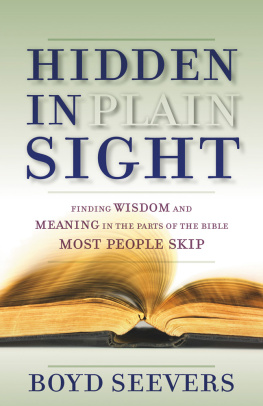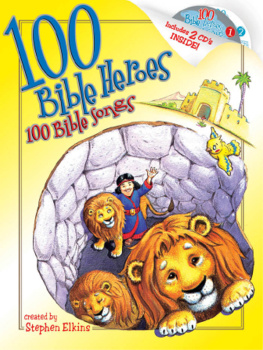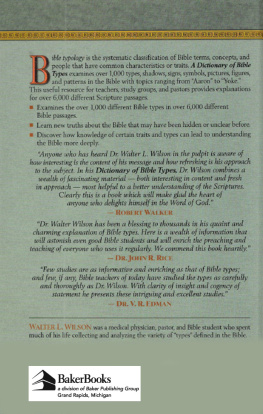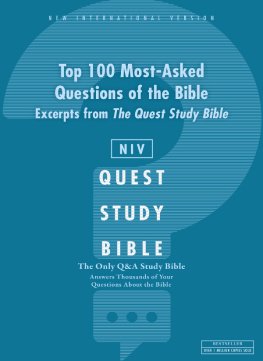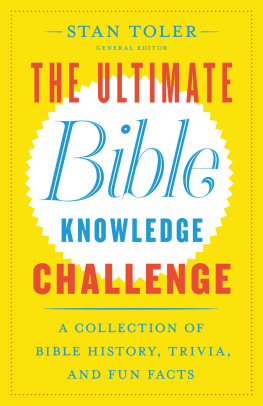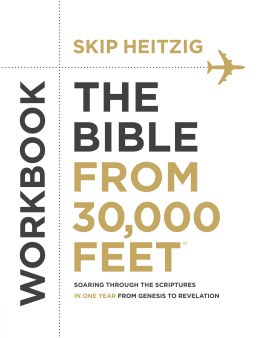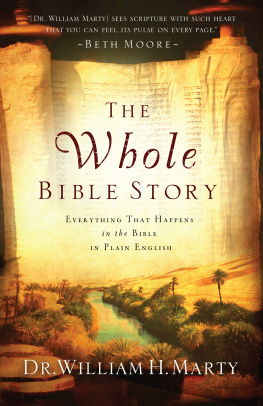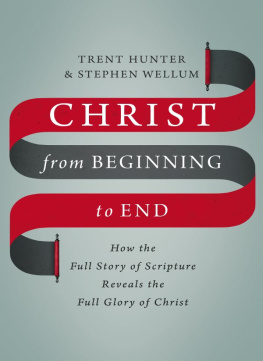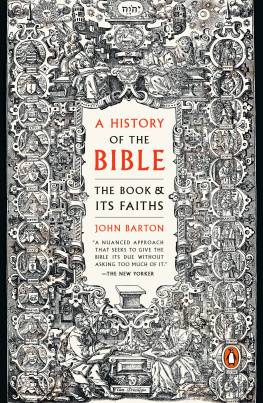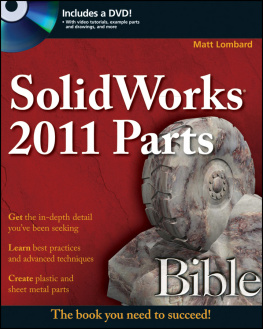
2012 by Boyd Seevers
Published by Bethany House Publishers
11400 Hampshire Avenue South
Bloomington, Minnesota 55438
www.bethanyhouse.com
Bethany House Publishers is a division of
Baker Publishing Group, Grand Rapids, Michigan
www.bakerpublishinggroup.com
Ebook edition created 2012
All rights reserved. No part of this publication may be reproduced, stored in a retrieval system, or transmitted in any form or by any meansfor example, electronic, photocopy, recordingwithout the prior written permission of the publisher. The only exception is brief quotations in printed reviews.
ISBN 978-1-4412-7013-9
Library of Congress Cataloging-in-Publication Data is on file at the Library of Congress, Washington, DC.
Unless otherwise indicated, Scripture quotations are from the Holy Bible, New International Version. NIV. Copyright 1973, 1978, 1984, 2011 by Biblica, Inc. Used by permission of Zondervan. All rights reserved worldwide. www.zondervan.com
Occasionally the author uses his own translation to better communicate a particular point that the original language allows.
Cover design by Eric Walljasper
Contents
Acknowledgments
This author wishes to thank the following:
- My very capable and kind editor, Andy McGuire, and the rest of the staff at Bethany House. Working with them on this project has been a pleasure.
- A former student, Ruth Page, whose capstone paper at Northwestern College, The Gospel According to Leviticus, has helped me better understand and appreciate Leviticus, and provided much of the material for the corresponding chapter in this book.
- My friend and colleague Randy Nelson for his insight and help on matters of hermeneutics.
- My very capable and helpful teaching assistant, Elyse Kallgren, for her skilled and prompt editing, and her encouragement.
Introduction
D o you think reading the Bible is tough at times, or even boring? Thats okay. Youre not alone.
You probably picked up this book because youre having trouble slogging through certain passages of the Bible, finding it difficult to understand them, let alone appreciate them. Maybe the Bible is a fairly new book for you, and youre trying to read it to learn more about God and relate to him better. Good for you!
But perhaps its not going so well. You find yourself getting bogged down as you keep running into parts of Gods Word that you dont understand or that you find really dull. Maybe that leaves you frustrated, a little confused, and thinking, Why doesnt this work better? Why should it be so hard? Shouldnt God want me to read his Word and help me get more out of it? How can it possibly be true that all of Gods Word is profitable, or useful, as it says in 2 Timothy 3:16? Have you seen some of the stuff in there?
If youve ever had questions like these or felt this way, again, its okay. Youre not alone.
On the other hand, maybe youre not so new at this. You have read the Bible a fair bit and gotten a lot out of itat least most of it. Maybe you have even tried to read all the way through the Bible. Again, good for you!
But still...
You keep running into parts of the Bible that are tough to get through. You started well in Genesis and really liked most of it (apart from the genealogies), and the first part of Exodus was enjoyable too. But the description of the Tabernacle in Exodus was kind of dry, and then it was repeated. But you got through that and hoped for something better. Then you found yourself in Leviticus with its laws of clean and unclean animals and such, and who needs all that? Numbers wasnt much better, so you gave up. If you have ever experienced something like this when trying to read through the Bible, thats okay too. You are not alone.
Or maybe youre a seasoned veteran when it comes to reading the Bible. You have known God for a long time and truly love reading his Word. You have read all the way through the Bible numerous times, and can honestly say that you enjoy itmost of it anyway. Good for you! What youd like is a way to better understand and get more out of certain parts of the Bible. You no longer need an introduction, you need a pick-me-up.
After all, some of the laws in the Old Testament seem irrelevant because of Jesus ministry. Good point. And those genealogies are real winnersfull of begats and lots of names you cant pronounce that dont seem to have much to do with anything. And then there are those prophets in the Old Testament or those weird visions in Daniel and Revelation What on earth are they talking about? Youre a veteran, but maybe you wouldnt mind a little help dealing with tough sections like these.
So regardless of how much you have read the Bible, if you find parts of it confusing, irrelevant, or dry, know that youre in good company. Many people feel that way. I have multiple degrees in Bible and theology and teach the Bible for a living, yet I still find parts of the Bible a little confusing and yes, even boring at times.
I have even had the pleasure (and known the challenges) of living in Israel for a number of years. I studied in Jerusalem for a year with my wife, and later we lived in Tiberias, Israel, for several more years doing ministry and raising our children there. Israel is a fascinating but difficult place, and of course, its the location of many of the events in the Bible. Living in the land of the Bible with the people and culture of the Bible (kind of) was a fascinating and worthwhile experience. That background often helps in understanding where the Bibles authors are coming from. But it doesnt always work. Sometimes I still get lost in what theyre saying, and I cant always see connections between their world back then and my world here and now.
So Whats the Plan?
I teach the Bible at a Christian college, and most of my students get perplexed now and then too. In fact, Ill be including quotes from some of them that express their frustrations with many of the parts of the Bible treated in this book. Because they struggle with the Bible at times, like you probably do, they seem relieved to discover that their professor also thinks some sections of the Bible are challenging and not very exciting. So we talk about why those sections seem that way. We discuss who the original audience was and what their needs were, as well as what the original authors intended to teach or communicate to them. Once the students understand those things, they can better appreciate these sections for what they are, and not try to turn them into something they arent supposed to be. Then they can see which parts of those passages are applicable today.
Its really a rather liberating process. It helps my students learn more from these sections and relieves some of the guilt from thinking that parts of the inspired Word of God are mundane or irksome. My students seem to appreciate it, and I think you will too.
Would you like some guidance in getting through the tough parts of the Bible? There is hope. This book will walk you through certain challenging parts of the Bible, but it will also give you a strategy for how you can approach similar sections on your own. The key to making the commonplace parts more interesting and helpful comes down to understanding the original context and purpose of a passage and then asking the right questions. Who wrote this? To whom was it written? What was their situation? What were their needs? What were the authors purposes in saying what he did?
Once you understand these issues, you can better appreciate the original purpose of the passage. Sometimes that purpose overlaps with our situation today, sometimes not. If it does, that section is more relevant. If it doesnt, the section has less relevance, and we can treat it differently. All Scripture is inspired, but not all of it was addressed to the kinds of situations that Gods people face here and now. Sorting out the purpose and relevance helps us better understand and appreciate the various sections of the Word of God for what they are.

